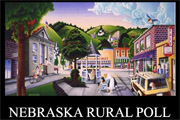Agricultural Economics, Department of

Nebraska Rural Poll
Date of this Version
2021
Document Type
Report
Citation
Nebraska Rural Poll, Research Report (February 2022) 21-4, 47 pages
Institute of Agriculture and Natural Resources, University of Nebraska-Lincoln
Also available at https://ruralpoll.unl.edu/pdf/21rpcommunity.pdf
Abstract
Rural Nebraskans are less positive about the current change and expected future change in their communities this year. The proportion believing their community has changed for the better has typically been greater than the proportion believing it has changed for the worse. However, this year the proportion believing their community changed for the worse was slightly more than the proportion believing it had changed for the better (similar to what occurred in 2003 and 2009). The proportion viewing positive change in their community sharply declined from last year. The proportion believing their community has stayed the same increased sharply. Despite that, rural Nebraskans are positive about their community by many different measures. Most rural Nebraskans rate their community favorably on its social dimensions, as friendly, trusting and supportive. Most rural Nebraskans also say it would be difficult to leave their community and have a positive attachment to their community. Finally, most rural Nebraskans disagree that their community is powerless to control its future.
Differences in perceptions of their community are evident by community size. Residents of larger communities are more likely than residents of smaller communities to say their community has changed for the better during the past year and will be a better place to live ten years from now. However, persons living in or near the smallest communities are more likely than persons living in or near larger communities to rate their community as friendly, trusting and supportive. And, persons living in or near larger communities are more likely than persons living in or near smaller communities to get what they need in their community. However, persons living in or near the smallest communities are more likely than persons living in or near larger communities to have an attachment to their community.
Except for some services that are largely unavailable in rural communities, rural Nebraskans are generally satisfied with basic community services and amenities. However, the proportion of rural Nebraskans satisfied with many social services and entertainment services has decreased during the past 20 years. Declines in satisfaction levels across the past 20 years occur with nursing home care, medical care services, senior centers, mental health services and retail shopping.
Some rural Nebraskans say that transgender people, gays and lesbians, recent immigrants to the U.S. and liberals are discriminated against in their community.
Included in
Agribusiness Commons, Agricultural and Resource Economics Commons, Civic and Community Engagement Commons, Community-Based Research Commons, Demography, Population, and Ecology Commons, Entrepreneurial and Small Business Operations Commons, Place and Environment Commons, Public Affairs, Public Policy and Public Administration Commons, Regional Economics Commons, Rural Sociology Commons

